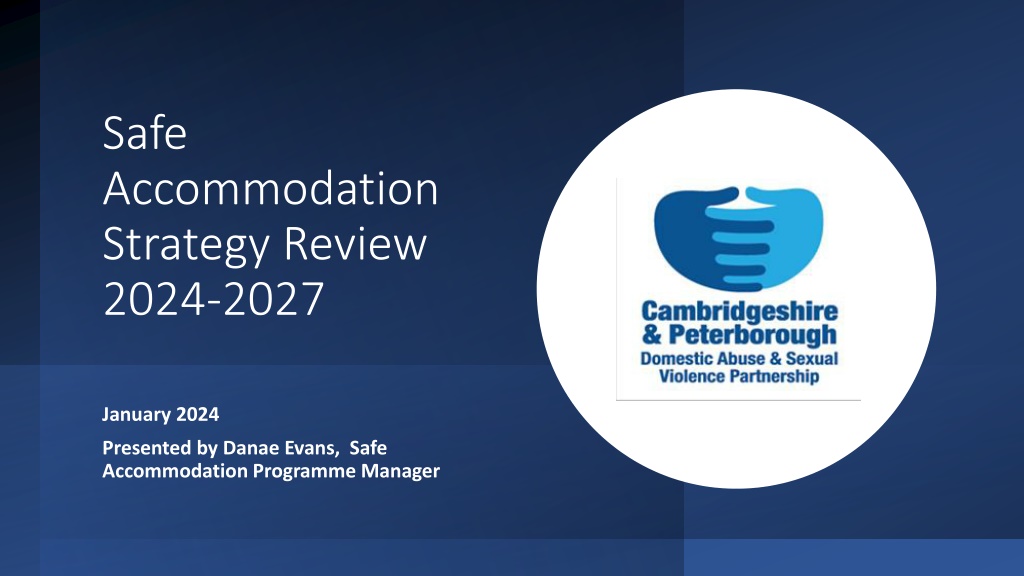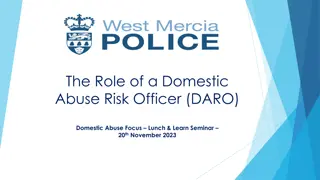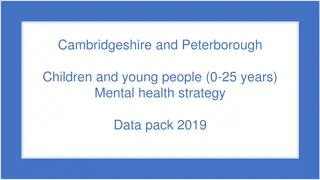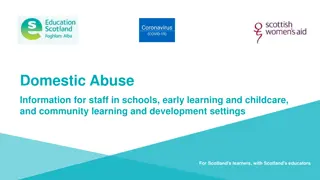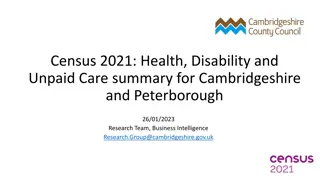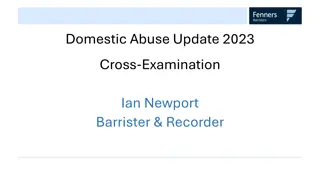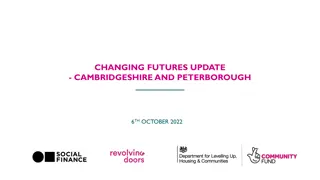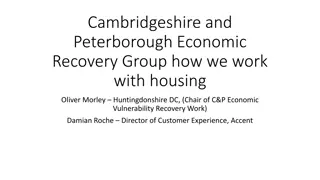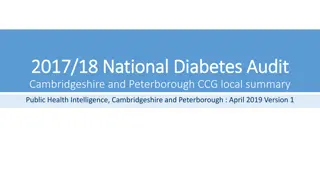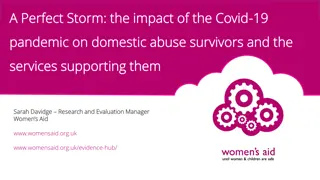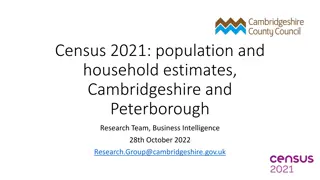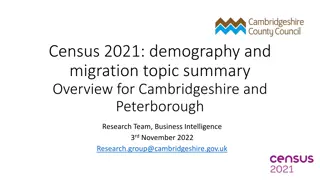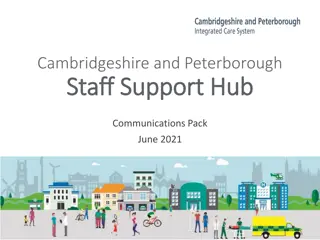Safe Accommodation Strategy Review 2024-2027: Addressing Domestic Abuse Challenges in Cambridgeshire & Peterborough
This presentation by Danae Evans, the Safe Accommodation Programme Manager, evaluates the current Safe Accommodation Strategy and outlines key challenges in providing safe accommodation, therapeutic support, cultural competency, and consistent data collection for survivors of domestic abuse in Cambridgeshire & Peterborough. It highlights the prevalence of domestic abuse, including referrals to the Independent Domestic Violence Advisor service, and proposes strategies for 2024-2027 based on a Whole Housing Approach.
Download Presentation

Please find below an Image/Link to download the presentation.
The content on the website is provided AS IS for your information and personal use only. It may not be sold, licensed, or shared on other websites without obtaining consent from the author. Download presentation by click this link. If you encounter any issues during the download, it is possible that the publisher has removed the file from their server.
E N D
Presentation Transcript
Safe Accommodation Strategy Review 2024-2027 January 2024 Presented by Danae Evans, Safe Accommodation Programme Manager
Safe Accommodation Strategy, 2024 Safe Accommodation Strategy, 2024- -2027 2027 The Domestic Abuse Act 2021 set in statute that Tier One authorities must prepare and publish a local strategy based on a robust needs assessment that sets out the ways in which provision for accommodation-based domestic abuse support will be developed, commissioned, and delivered. The first Safe Accommodation Strategies for Cambridgeshire and Peterborough were published in October 2021.Strategies must be reviewed every three years. This presentation is to review the work achieved by the current Safe Accommodation Strategy across Cambridgeshire and Peterborough. It also outlines any proposed changes to the current strategies going forward into 2024-2027, following the 2023 VAWG needs assessment. These strategies are based on the Whole Housing Approach and look for a collaborative response to domestic abuse support across all housing settings.
Identification of Local Needs Identification of Local Needs Key challenges for the Domestic Abuse system, are currently: Provision of easily accessible safe accommodation to those at risk of abuse and their children, acknowledging survivors' choice where it is safe, to stay within the county and near established links if provided with additional support. Provision of therapeutic support for survivors and their children who have experienced domestic abuse. Need for cultural competency among service providers, navigating highly complex circumstances for survivors, language barriers and concerns around immigration status. Ensuring support and training is provided across the housing sector in Cambridgeshire & Peterborough to continue to improve awareness of and support to, those experiencing domestic abuse. Ensuring a consistency of support across both urban and very rural areas. Domestic abuse data is not collected and collated consistently across all partners who work with survivors, to be able to assess local needs accurately.
Prevalence / Local Need Prevalence / Local Need Estimated number of victims of Domestic Abuse (aged 16+) in Cambridgeshire & Peterborough based on the Crime Survey for England and Wales prevalence estimates for 2022/23* - 32,000 The majority of victims were recorded as female (66%), with 32% of victims being male Violence against the person accounted for the majority of Domestic Abuse related offences in Cambridgeshire and Peterborough ranging from 77%-78% of all offences over the last four years. Arson and criminal damage was the next most prevalent category of DA offence, accounting for 7% of offences in 2022/23 32% of children responded that there had been any physical aggression or any shouting or arguing at home in the last month that frightened them (Source: Data provide by Public Health from Health-Related Behaviours Survey Cambridgeshire & Peterborough) 2022. Referrals to the Independent Domestic Violence Advisor (IDVA) service increased by over 25%, largely due to the increase in specialist staff and threshold for referrals. 3186 referrals in 2022/23.
Safe Accommodation Strategy 21 Safe Accommodation Strategy 21- -24. Year: 2022/23 24. Year: 2022/23 Refuge : Funding for the 4 refuges in Cambridgeshire & Peterborough: CWA, PWA, Refuge Fenland and Refuge Mid Cambs. During 2022/23- 102 Women accessed refuge accommodation. Specialist Children s Workers in Refuges 72 children supported. Dispersed Accom: 8 units of dispersed accommodation across Cambridgeshire & Peterborough , 11 households accessed this accommodation during 2022/2023, including survivor with six children, client with mobility issues and clients with NRPF waiting for DDVC. Target Hardening: 508 Survivors across C&P were provided with target hardening measures, to help them to stay safely in their homes. Housing IDVAs: Four housing IDVAs Co-located within three housing advice teams and providing a named IDVA link to each housing advice team in the County. 327 survivors supported by Housing IDVAs in 2022/23. Managed Reciprocals: 14 survivors/households helped to move within the County via Reciprocal scheme without having to lose their existing tenure or make homeless applications.
Safe Accommodation Strategy 21 Safe Accommodation Strategy 21- -24. Year: 2022/23 24. Year: 2022/23 DAHA: All Tier 2 Local Authorities and Peterborough City Council now seeking DAHA accreditation, with South Cambridgeshire accredited successfully and Cambridge City Council re-accredited as were Cambridge Housing Society. Cross Keys are DAHA accredited. Flexible Funding: provided to 160 survivors to assist with a range of issues: furniture, travel, additional security, food and clothing. Purpose of funding is to enable survivors to remain safe and reduce reconciliation. Therapeutic Support: Referral made to Embrace Child Victims of Crime 87 children. Domestic Abuse awareness Private Sector housing/landlord engagement Delivered six online webinar's and attended local Landlord forums and steering groups, raising awareness about domestic abuse and how landlords and agents can identify and offer support to tenants experiencing domestic abuse. NRPF- all services available to those with no recourse, except for local refuges.*
Proposed Changes (2024/27) Proposed Changes (2024/27) Shared Lives Project to offer support to survivors of domestic abuse with learning disabilities support The pilot, led by a Shared Lives Co-ordinator post funded for two years from Safe Accommodation funding, utilises the Shared Lives approach of carers welcoming people with support needs into their own homes. Funding for an Eastern European IDVA in Cambridgeshire, to recognise the need for support from specialist IDVAs who can communicate in their first language and understand their lived experience The strategy no longer focuses on DAHA as this work is well underway Removal of the Housing First IDVA role as not financially viable but developing links with those working with survivors who are rough sleeping, accessing insecure housing to provide information of about domestic abuse support is available and increase referrals to domestic abuse support services within this group. Through this strategy, feedback mechanisms for victims and their children will be developed to ensure there is independent representation which operates from views gathered independently of the commissioned services.
Delivery of the Safe Accommodation Strategy 2024 Delivery of the Safe Accommodation Strategy 2024- -27 27 The strategy is the statutory responsibility of Cambridgeshire County Council and Peterborough City Council and must be agreed by cabinet. This strategy will be overseen by the Domestic Abuse & Sexual Violence Strategic Partnership Board and Violence Against Women & Girls Operations Group, in conjunction with the Housing Board. Once published a working action plan will be developed to ensure all elements are working in conjunction with each other and the needs of all victims are being met appropriately, and there will be mechanisms in place to ensure effective oversight
Feedback Your views are helpful! If you have any comments please feedback How does your service collate domestic abuse data/information? Could this be collated to be able to measure progress more accurately? Please contact Danae.evans@cambridgeshire.gov.uk Vickie.crompton@cambridgeshire.gov.uk
